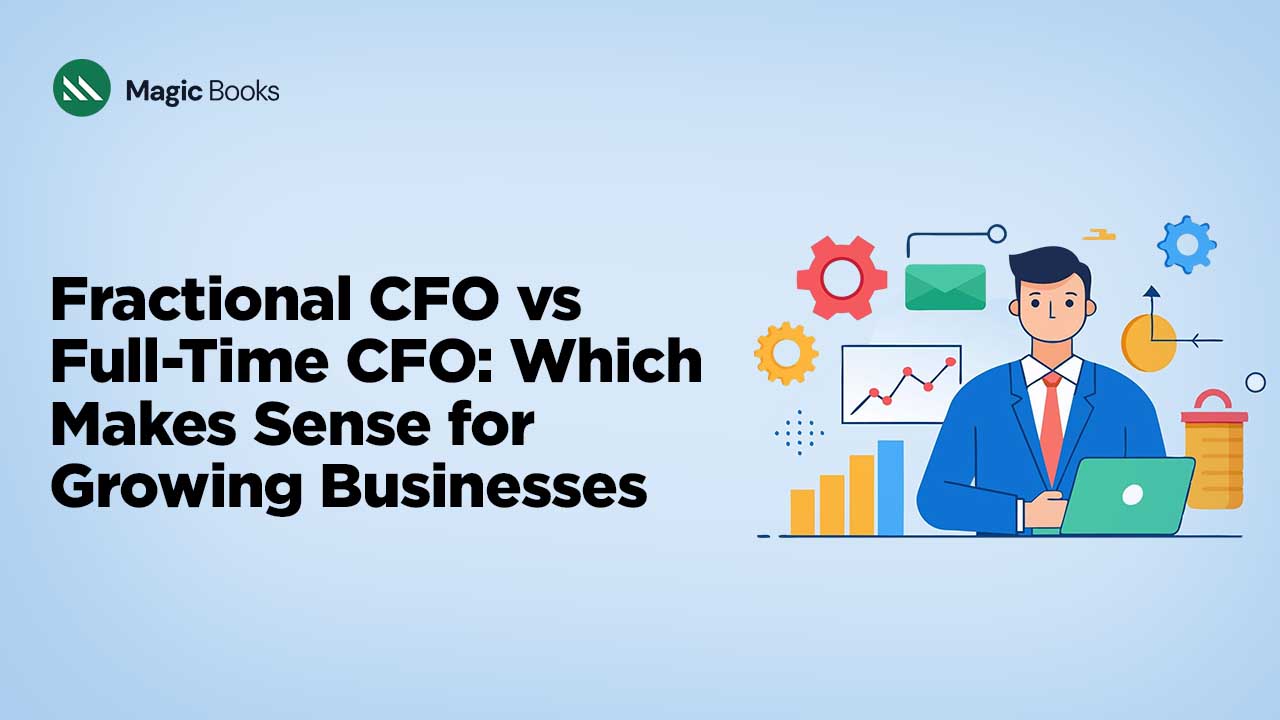The U.S. finance & accounting outsourcing market generated approximately $17.25 billion in revenue in 2024. That’s not pocket change. It tells us something important: businesses are rethinking how they staff their finance teams. For growing companies trying to balance tight budgets with real financial needs, the question of whether to bring on a fractional or full-time CFO has moved from theoretical to urgent.
What Is a Fractional CFO?
A fractional CFO is someone who gives you part-time strategic financial leadership without joining your company permanently. Think of it as borrowing senior expertise when and where you need it most.
These professionals work on an outsourced or interim basis, carving out a specific number of hours each week or month to tackle your financial challenges. Most fractional CFOs dedicate somewhere between 10 and 20 hours weekly to each client, though that can shift based on how complex your situation is.
What Is a Full-Time CFO?
A full-time CFO is a permanent executive hire who owns your entire financial operation. This person shows up every day to handle strategy, reporting, capital planning, and making sure you stay compliant with regulations.
They work 40-plus hours a week and sit at the executive table alongside your CEO and COO. You get someone fully embedded in your culture, someone who knows your business inside and out.
The Cost Reality
Let’s talk numbers because that’s usually where this decision starts.
The median total compensation for a full-time CFO in the U.S. hit around $444,404 per year as of August 2024, according to data from Salary.com. But that’s just base comp. When you add benefits, payroll taxes, bonuses, and equity, you’re easily looking at $500,000 or more annually for mid-sized and larger organizations. That kind of fixed cost puts full-time CFOs out of reach for a lot of growing businesses, especially if you’re still burning through seed funding or operating on lean margins.
Fractional CFO services run quite a bit lighter. You’re typically looking at monthly retainers between $3,000 and $12,000, with most engagements landing in the $5,000 to $7,500 range. If you prefer hourly billing, rates fall between $175 and $350 per hour depending on the CFO’s background and where they’re located. Some estimates suggest businesses save 30% to 40% by going fractional compared to hiring full-time staff.
But there’s a tradeoff. Fractional CFOs cost less, but they’re only around part of the time. You get efficiency and flexibility, not constant availability. Full-time CFOs bring continuity and deep institutional knowledge, but they also bring a big recurring expense and all the overhead that comes with a senior executive role.
Strategic Planning and Forecasting
Both models can handle financial planning and forecasting, but the depth and frequency differ. Fractional CFOs often bring a wealth of cross-industry experience. They can quickly build forecasting models, run scenario analyses, and set up budgeting frameworks that fit your growth stage. The catch is that their limited hours may mean less frequent updates to those forecasts. If your business moves fast and assumptions change weekly, you might find yourself waiting for your fractional CFO’s next scheduled check-in.
Full-time CFOs live in your numbers every day. They adjust forecasts as new data rolls in and keep financial plans aligned with what’s happening across every department. If your operations are fairly stable and predictable, a fractional CFO can probably keep up. But if you’re scaling quickly or dealing with market volatility, having someone on-site who can react in real time often becomes necessary.
Managing Cash Flow and Working Capital
Cash flow doesn’t sleep, and neither should oversight of it. Fractional CFOs can definitely set up the systems and dashboards you need to track receivables, payables, inventory, and capital spending. But their weekly time cap might not allow for the kind of daily, hands-on monitoring that some businesses require. If your cash runway is tight or your revenue swings wildly by season, gaps in attention can turn into real liquidity problems fast.
Full-time CFOs provide continuous, real-time cash flow oversight. They can jump on payment term negotiations with vendors, speed up collections, and optimize your cash conversion cycle with an agility that part-time executives can’t match. When cash is king, having someone who’s always watching matters.
Fundraising and Investor Relations
Raising capital is time-intensive, especially during active rounds or when investors are doing due diligence. Fractional CFOs can absolutely prepare your financial models, pitch decks, and data rooms. Many of them have managed fundraising for multiple companies and bring that experience to your table. For a one-off seed round or early-stage raise, a fractional CFO might be all you need.
But if you’re in continuous fundraising mode, preparing for an IPO, managing a roster of investor relationships, or navigating complicated debt covenants, a full-time CFO usually becomes essential. The communication load, the reporting cadence, and the strategic coordination involved in ongoing investor relations just exceeds what most fractional arrangements can handle.
Compliance, Controls, and Reporting
Regulatory compliance and financial reporting are non-negotiable CFO responsibilities. Fractional CFOs can design internal controls, coordinate audits, and make sure you’re compliant with standards like ASC 606 for revenue recognition. A lot of fractional CFOs actually specialize in compliance-heavy industries and bring deep expertise to companies facing new regulatory requirements.
That said, full-time CFOs are better suited for managing complex, multi-entity reporting or industries with heavy regulatory burdens that demand constant attention. If you’re in healthcare, financial services, or you’re a public company, the continuous oversight and accountability that only a full-time executive can provide often becomes a requirement, not a nice-to-have.
When Fractional Makes More Sense
Fractional CFO arrangements work best for businesses in early growth stages, usually with annual revenues below $10 million, that need strategic financial guidance but can’t justify the cost of a full-time hire.
If your financial operations are relatively straightforward , your compliance requirements are manageable, and you have clear project-based needs like preparing for a fundraising round or implementing new accounting systems, fractional models deliver a lot of value.
The broader finance and accounting outsourcing market is projected to grow at a compound annual growth rate of 8.9% from 2025 to 2030, according to industry forecasts. Recent trends show that 83% of CFOs cite accounting talent shortages as a major concern, which is driving more organizations to explore outsourced alternatives. For businesses with temporary needs, seasonal spikes, or limited cash reserves, fractional CFOs offer immediate access to expertise without locking you into long-term fixed costs.
When Full-Time Makes More Sense
If you have continuous capital markets needs, complex multi-entity reporting, or operate in a heavily regulated industry, you probably need a full-time CFO. Companies preparing for IPOs, managing multiple investor relationships, or operating across numerous jurisdictions need the institutional knowledge and daily oversight that only a permanent executive can provide.
Businesses at inflection points also benefit from full-time leadership. If you’re scaling from $20 million to $100 million in revenue, you need a strategic partner who’s fully embedded in your culture and operations. When your CEO and board need constant access to financial leadership for decision-making, collaboration, and accountability, a full-time CFO stops being optional.
Hidden Costs and Operational Realities
Bringing on a fractional CFO involves a shorter onboarding than recruiting a full-time executive, but integration challenges still exist. Fractional CFOs juggling multiple clients might face availability constraints during your most critical periods. Their intermittent presence can also create coordination gaps with your full-time internal team.
Full-time CFO hires come with hidden costs that extend well beyond base salary. You’re on the hook for payroll taxes, health benefits, retirement contributions, and equity compensation, which can add 25% to 40% to your total employment cost. Onboarding a full-time CFO also takes longer, often three to six months, as they develop organizational knowledge and build internal relationships.
Cultural fit is another consideration worth thinking about. Fractional CFOs bring experience and expertise, but their part-time engagement means they might not fully assimilate into your company culture. Full-time CFOs become integral members of your leadership team and are better positioned to align financial strategies with your values and long-term vision.
A Simple Decision Framework
Three checkpoints can help you decide which model fits your business. First, look at your cost threshold. If you’re generating less than $10 million in annual revenue and cash flow is constrained, fractional arrangements usually make more financial sense. Second, evaluate your complexity threshold. If you operate multiple entities, face heavy regulatory oversight, or manage continuous capital markets activity, a full-time CFO is likely necessary. Third, consider your continuity threshold. If your CEO and board need daily strategic partnership and real-time financial oversight, full-time leadership becomes the right choice.
The U.S. finance and accounting outsourcing market is expected to reach $28.8 billion by 2030, reflecting growing acceptance of flexible financial leadership models. As businesses navigate evolving financial landscapes, the decision between fractional and full-time CFOs needs to align with organizational size, growth trajectory, cash availability, and strategic objectives. Both models deliver value when matched appropriately to business needs. Many companies find that their requirements shift as they scale, starting with fractional support and transitioning to full-time leadership as complexity and revenue grow.For finance professionals seeking additional resources, templates, and continuing education on CFO hiring and financial leadership strategies, Magicbooks to explore practical tools designed to support informed decision-making.



